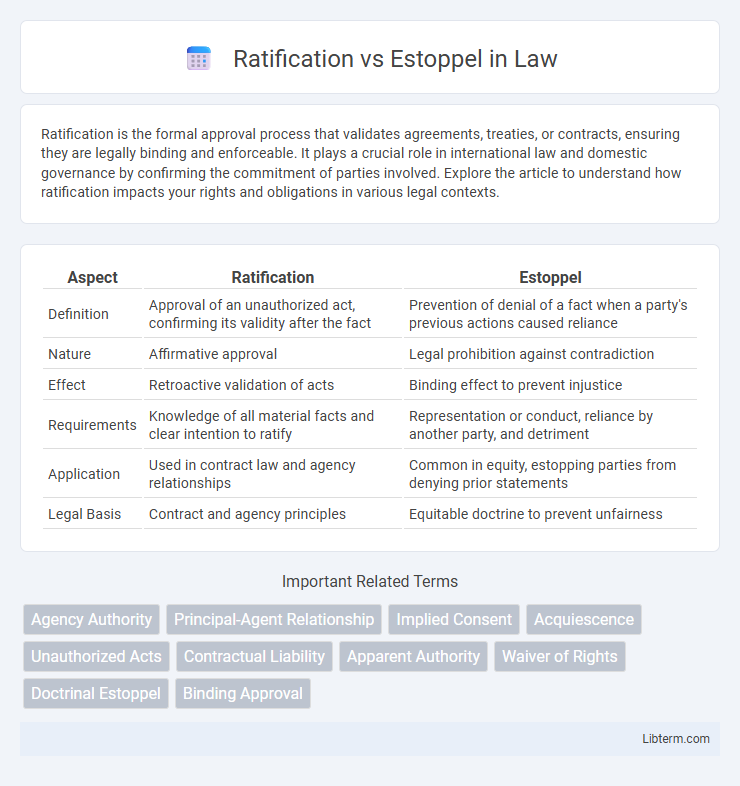Ratification is the formal approval process that validates agreements, treaties, or contracts, ensuring they are legally binding and enforceable. It plays a crucial role in international law and domestic governance by confirming the commitment of parties involved. Explore the article to understand how ratification impacts your rights and obligations in various legal contexts.
Table of Comparison
| Aspect | Ratification | Estoppel |
|---|---|---|
| Definition | Approval of an unauthorized act, confirming its validity after the fact | Prevention of denial of a fact when a party's previous actions caused reliance |
| Nature | Affirmative approval | Legal prohibition against contradiction |
| Effect | Retroactive validation of acts | Binding effect to prevent injustice |
| Requirements | Knowledge of all material facts and clear intention to ratify | Representation or conduct, reliance by another party, and detriment |
| Application | Used in contract law and agency relationships | Common in equity, estopping parties from denying prior statements |
| Legal Basis | Contract and agency principles | Equitable doctrine to prevent unfairness |
Introduction to Ratification and Estoppel
Ratification occurs when a principal adopts and confirms an act performed on their behalf, making the act legally binding despite initial unauthorized conduct. Estoppel prevents a party from denying a fact or right when their previous conduct or representations have led another to reasonably rely on them to their detriment. Both doctrines serve to uphold fairness and prevent injustice by validating voluntary adoption or reliance on prior actions or statements.
Definition of Ratification
Ratification is the express or implied approval of an act performed on another's behalf, making the act legally binding as if originally authorized. This concept allows a principal to validate unauthorized actions after the fact, confirming the agent's authority retroactively. Estoppel, in contrast, prevents a party from denying a previously accepted position or representation.
Definition of Estoppel
Estoppel is a legal principle preventing a party from asserting a claim or fact contradictory to their previous statements or actions if it would harm another who relied on the original stance. It serves to enforce fairness and consistency by barring contradictory assertions when one has induced reliance from others. Unlike ratification, which involves approval of unauthorized acts, estoppel focuses on precluding denial of established facts or positions in judicial proceedings.
Key Differences Between Ratification and Estoppel
Ratification involves a party affirming and accepting responsibility for an act initially done without authority, effectively validating it retroactively. Estoppel prevents a party from denying a fact or right due to their previous conduct or representations, ensuring fairness by barring contradictory claims. The key difference lies in ratification being an express or implied approval of unauthorized acts, while estoppel enforces consistency in behavior to prevent injustice.
Types of Ratification in Contract Law
Ratification in contract law includes express, implied, and ostensible types, each confirming a contract's validity either through explicit agreement, conduct consistent with approval, or representation leading others to believe authorization exists. Express ratification occurs when a party clearly communicates acceptance of the contract terms after discovering a defect or unauthorized act. Implied ratification arises from actions indicating consent, such as accepting benefits, while ostensible ratification is based on the appearance of authority created by the principal's behavior, preventing them from denying the agent's actions.
Types of Estoppel Recognized in Law
Estoppel in law includes several key types such as promissory estoppel, where a party is prevented from going back on a promise that another party relied upon; estoppel by representation, which stops a person from denying a fact they previously asserted; and estoppel by deed, which applies when a party cannot contradict statements or promises made in a formal deed. Other recognized forms are estoppel by record, arising from judicial decisions, and estoppel by silence, which occurs when failure to speak or act misleads another. Understanding these types contrasts with ratification, which involves the approval of an act after it has been performed, confirming its validity.
Legal Requirements for Ratification
Ratification requires clear evidence of an individual's intention to affirm a prior unauthorized act, typically demonstrated through explicit approval or conduct consistent with acceptance. The principal must have full knowledge of the material facts regarding the transaction before ratifying the act to ensure legal validity. Unlike estoppel, ratification necessitates voluntary consent and awareness, making it essential that the principal exercises informed and deliberate approval in accordance with contract law principles.
Legal Requirements for Estoppel
Estoppel requires a clear representation or conduct by one party that induces another party to reasonably rely on it, causing detriment if the representation is later denied. Legal requirements for estoppel include a definite representation, reliance by the promisee, and resulting prejudice or harm due to that reliance. Ratification, in contrast, involves affirming a prior unauthorized act, while estoppel prevents a party from contradicting their previous conduct or statements that misled another party.
Practical Applications: Ratification vs Estoppel
Ratification enables a principal to affirm and validate an act initially performed without authority, thereby binding the principal to the act retroactively. Estoppel prevents a party from denying a fact or claim when their previous conduct, representations, or silence has led another party to reasonably rely on that information, causing detriment. In practical applications, ratification is often used in agency law to validate unauthorized acts, while estoppel frequently applies in contractual disputes to enforce fairness by preventing inconsistent positions.
Conclusion: Choosing Between Ratification and Estoppel
Choosing between ratification and estoppel depends on the context of authorization and reliance; ratification confirms and validates an unauthorized act as if originally authorized, while estoppel prevents a party from denying a representation that another has reasonably relied upon. Ratification requires voluntary acceptance after the fact, whereas estoppel arises from preventing injustice due to reliance on a statement or conduct. Evaluating factors such as timing, intent, and reliance is essential for determining the appropriate legal remedy.
Ratification Infographic

 libterm.com
libterm.com